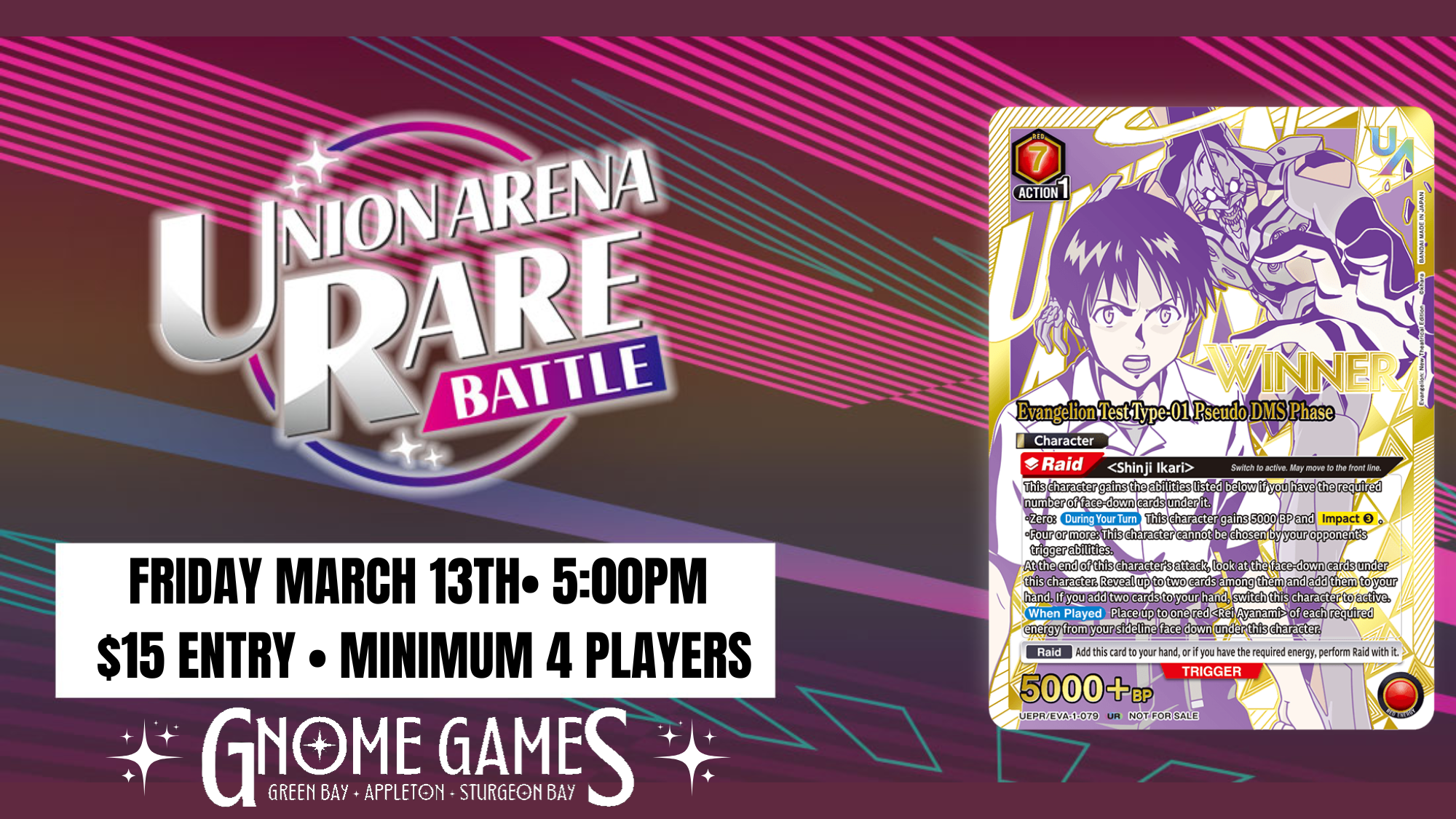
Join us at Gnome Games Green Bay East for our Union Arena Rare Battle: Evangelion: New Theatrical Edition!
Friday, March 13th,
Entry is $15
Starting at 5pm
We’re hosting a Rare Battle for Union Arena! This week’s theme: Evangelion: New Theatrical Edition! Aim for victory within your favorite titles in the special tournaments called “UNION ARENA RARE BATTLE”! This event type uses ONE Battle Rules so all participants use decks from the same title to battle for a “UNION RARE CARD”, which is only in this event! All participants receive an event pack, 4th through 2nd place receive an exclusive promo card, and the winner gets a special Winner card!
What do I need to participate?
A Union Arena legal deck is required to participate, and the deck has to be themed around Evangelion: New Theatrical Edition. Additionally, players must register for the event through TCG+.
What is Union Arena?
UNION ARENA is a “Common Rules Trading Card Game”, which means players only need to learn 1 set of rules to play this card game using characters from series they love. In UNION ARENA you can find many popular characters from various series on the cards! Make a deck with characters from your favorite series and enjoy battles that even cross series! For more information on how to play Union Arena, check here!
Interested in more Union Arena news? Check out their website!
More Union Arena Events are on our Gnome Games calendar!
*Event pricing is subject to adjustment due to unforeseen increases in supplier and operating costs, including changes to tariffs and duties.
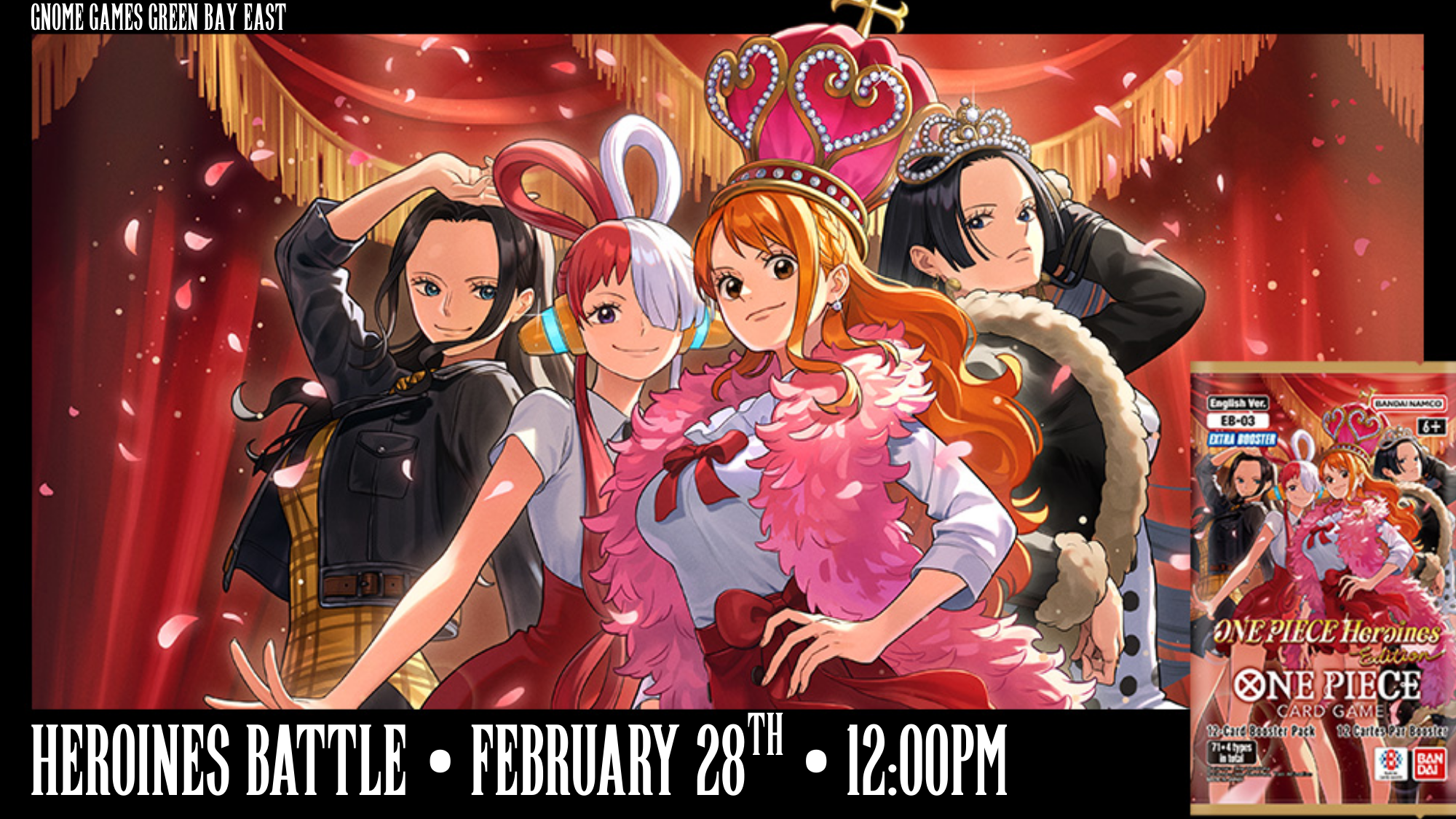
Let’s battle using Heroines Leader cards only!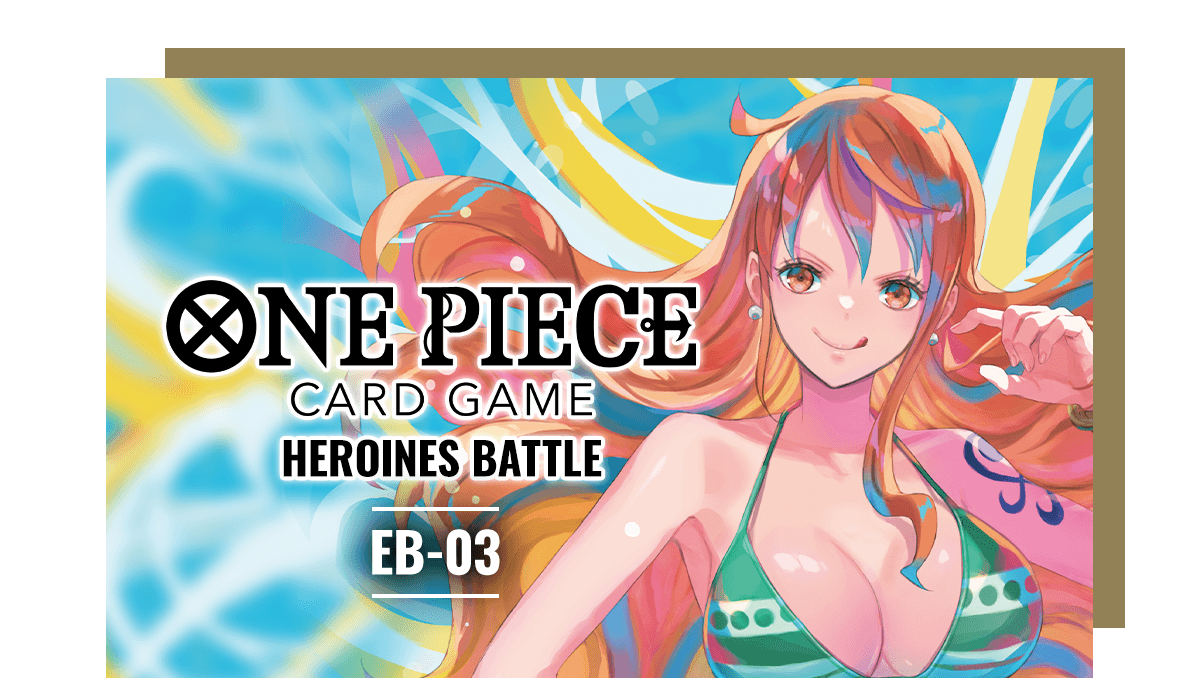
Saturday, February 28th
Starting at 12pm
Entry is $*
Join Us at Gnome Games Green Bay East to celebrate the release of EB03 and take on a special tournament limited to Heroine Leader cards only! We will have a Win a Match, Win a Pack Tournament with promos for the event. Rules for deck construction is below and we can’t wait to see you all for the Heroines Battle!
Check out more Gnome Games Events on our Calendar HERE!
Format
- ・Constructed
- ・Players can only use the following leaders. (Heroines Leaders)
- *Alt-art cards can also be used.
- ・OP03-077 Charlotte Linlin
- ・OP04-001 Nefeltari Vivi
- ・OP04-039 Rebecca
- ・OP05-002 Belo Betty
- ・OP06-001 Uta
- ・OP06-021 Perona
- ・OP06-022 Yamato
- ・OP06-042 Vinsmoke Reiju
- ・OP07-019 Jewelry Bonney
- ・OP07-038 Boa Hancock
- ・OP08-021 Carrot
- ・OP08-058 Charlotte Pudding
- ・OP09-022 Lim
- ・OP09-062 Nico Robin
- ・OP10-003 Sugar
- ・OP11-022 Shirahoshi
- ・OP11-041 Nami
- ・OP12-081 Koala
- ・OP13-100 Jewelry Bonney
- ・P-011 Uta
- ・P-117 Nami
- ・ST07-001 Charlotte Linlin
- ・ST09-001 Yamato
- ・ST11-001 Uta
- ・EB03-001 Nefeltari Vivi
- ・OP14-041 Boa Hancock
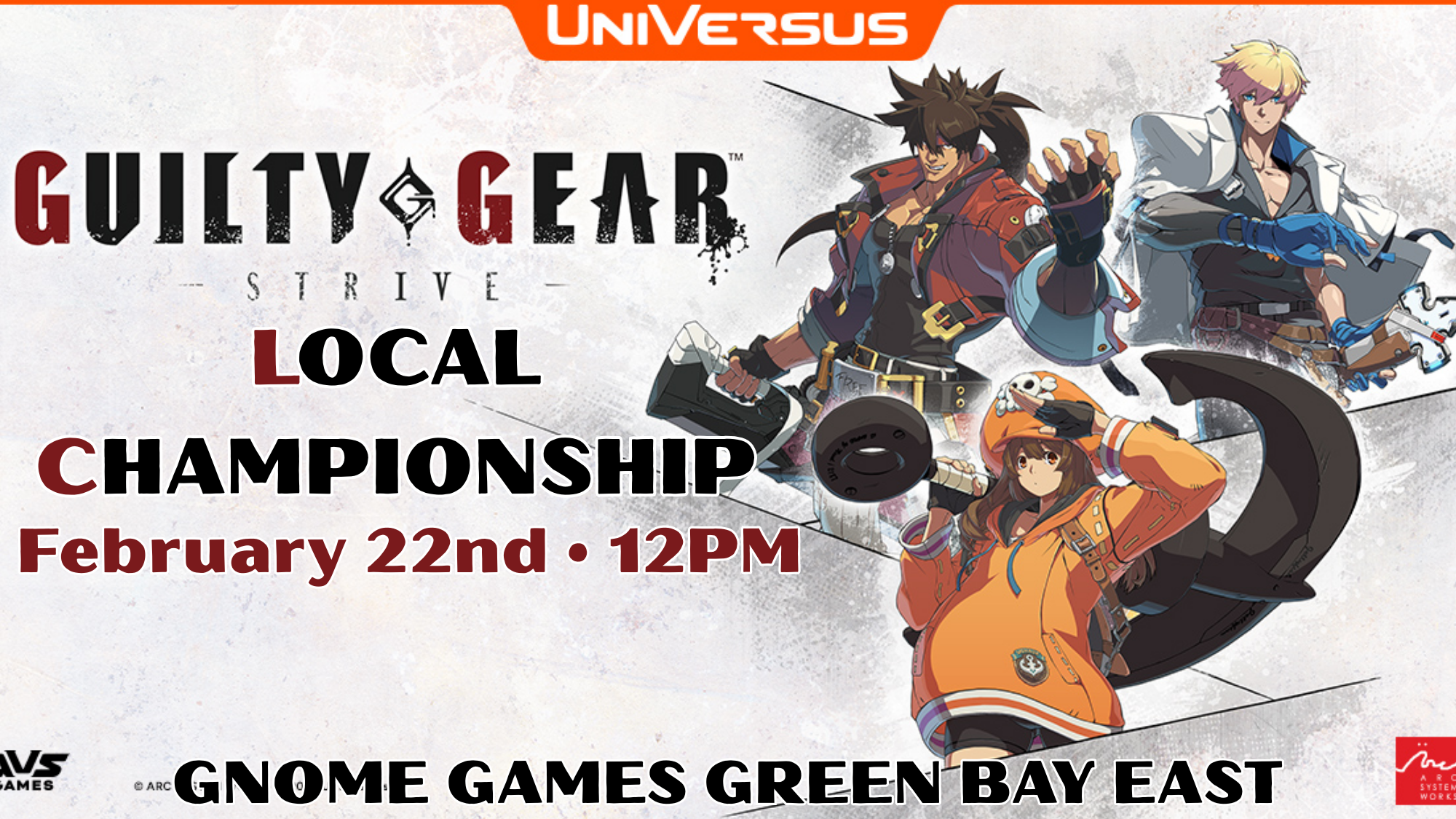
Join us at Gnome Games Green Bay East for our UniVersus -Guilty Gear: Strive- Local Championship!
Sunday, February 22nd
Starting at 12pm
Entry is $20
On Sunday, February 22nd at 12 PM we’re hosting a Guilty Gear: Strive Local Championship! This will be a Swiss style tournament with rounds based on attendance. At most there will be 4 rounds, with a Top 4 top cut. Round times are 60 minutes best of 3, and Top Cut is 90 minutes, first to lose 2 rounds loses. A Local Championship is a higher level competitive tournament, and comes with proper rewards for the challenge! All participants will receive a participation promo, the top 8 receive a promo card, top 4 receive a promo card, 2nd place receives a promo card, and the grand winner receives a Winner promo card and a Local Championship playmat!
Players must register ahead of time on the UniVersus Gaming Network website. Entry is $20. Players are expected to be well versed in the rules for UniVersus play and have tournament legal decks.
For more UniVersus information, take a look at their website!
More UniVersus events can be found on our Gnome Games calendar!
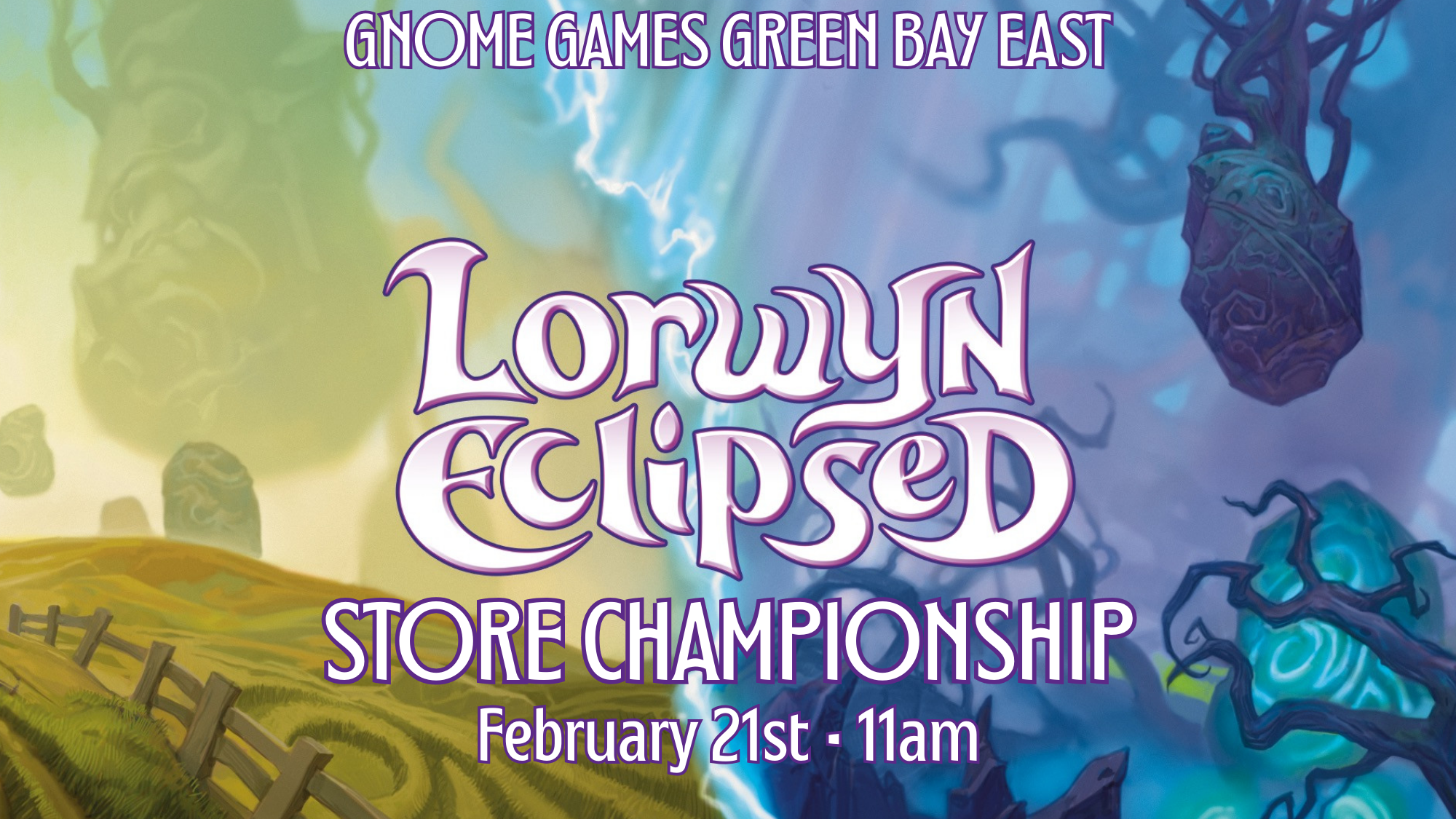
Join us at Gnome Games Green Bay East for our Magic the Gathering: Lorwyn Eclipsed Store Championship!
Saturday, February 21st
Starting at 11am
Entry is $20
On Saturday, February 21st we will be hosting a competitive level Store Championship for Lorwyn Eclipsed! Starting at 11:00 AM, players will sit and play in 3+ rounds of a Swiss style tournament where each match they win, they win a pack! Promo cards *while supplies last* will go out for all participants, the top 8, and 1 exclusive promo for the winner!
Entry to this event is $20*. Players may preregister on the Companion app using the following code:
What do I need to participate?
A Wizards account is required for entry. Participants have to come prepared with a fully legal Standard 60 card deck. For reference, current standard legal sets are the following:
Lorwyn Eclipsed
Magic: The Gathering | Avatar the Last Airbender
Magic: The Gathering | Marvel’s Spider-Man
Edge of Eternities
Magic: The Gathering—FINAL FANTASY
Tarkir: Dragonstorm
Aetherdrift
Magic: The Gathering® Foundations
Duskmourn: House of Horror
Bloomburrow
Outlaws of Thunder Junction (including The Big Score)
Murders at Karlov Manor
The Lost Caverns of Ixalan
Wilds of Eldraine
The Magic the Gathering website has more information about the Standard format.

 Gnome Games Green Bay East Pokémon League
Gnome Games Green Bay East Pokémon League
Gnome Games invites players out for a Gym Leader Challenge league! We’ll be giving out random promos from the Gnome vault for those who are up to the challenge!
What’s a Gym Leader Challenge?
- Your deck can only contain one type (color) of Pokémon.
- Only one of each card with the same name allowed in a deck, except for Basic Energy.
- Cards with a Rule Box are not allowed.
- ACE SPEC cards are not allowed.
- Legal Cards: Black & White – onwards, and a short ban list
- 60 card decks are built & 6 Prize Card games are played with the most current Pokemon TCG rules.
This Gym Leader Challenge league will be part of our Sunday leagues in June and July.
Pokémon League is a fun and accessible way for Pokémon fans to get together and have some fun! Gnome Games Green Bay East Pokémon League events are open to all Pokémon TCG and video game players regardless of experience level or skill. Using your own cards and Pokémon video games, you can play, trade, and even earn cool prizes! The best part is that you can do all this with other Pokémon players who love collecting and playing just as much as you do.
Pokémon League events are a great way to learn game basics and get the feel for Pokémon competitive play before beginning to compete in Pokémon tournaments. In fact, many Pokémon League locations also run Pokémon Championship Series competitions designed for Pokémon fans who are just getting started.
Gnome Games has Pokémon Professors on hand at league sessions to assist new players in learning the basics of the game, creating new decks and strategy, and assisting with fair trading practices.
Gnome Games also has non-trading card game activities available for Pokémon fans of all ages and families are encouraged to join us as a fun family activity.
For more information about Pokemon Play! and Pokemon League visit the official Pokémon website.
Sundays busy? Visit on Wednesdays at 4:30 pm!

 Gnome Games Green Bay East Pokémon League
Gnome Games Green Bay East Pokémon League
Gnome Games invites players out for a Gym Leader Challenge league! We’ll be giving out random promos from the Gnome vault for those who are up to the challenge!
What’s a Gym Leader Challenge?
- Your deck can only contain one type (color) of Pokémon.
- Only one of each card with the same name allowed in a deck, except for Basic Energy.
- Cards with a Rule Box are not allowed.
- ACE SPEC cards are not allowed.
- Legal Cards: Black & White – onwards, and a short ban list
- 60 card decks are built & 6 Prize Card games are played with the most current Pokemon TCG rules.
This Gym Leader Challenge league will be part of our Sunday leagues in June and July.
Pokémon League is a fun and accessible way for Pokémon fans to get together and have some fun! Gnome Games Green Bay East Pokémon League events are open to all Pokémon TCG and video game players regardless of experience level or skill. Using your own cards and Pokémon video games, you can play, trade, and even earn cool prizes! The best part is that you can do all this with other Pokémon players who love collecting and playing just as much as you do.
Pokémon League events are a great way to learn game basics and get the feel for Pokémon competitive play before beginning to compete in Pokémon tournaments. In fact, many Pokémon League locations also run Pokémon Championship Series competitions designed for Pokémon fans who are just getting started.
Gnome Games has Pokémon Professors on hand at league sessions to assist new players in learning the basics of the game, creating new decks and strategy, and assisting with fair trading practices.
Gnome Games also has non-trading card game activities available for Pokémon fans of all ages and families are encouraged to join us as a fun family activity.
For more information about Pokemon Play! and Pokemon League visit the official Pokémon website.
Sundays busy? Visit on Wednesdays at 4:30 pm!

 Gnome Games Green Bay East Pokémon League
Gnome Games Green Bay East Pokémon League
Gnome Games invites players out for a Gym Leader Challenge league! We’ll be giving out random promos from the Gnome vault for those who are up to the challenge!
What’s a Gym Leader Challenge?
- Your deck can only contain one type (color) of Pokémon.
- Only one of each card with the same name allowed in a deck, except for Basic Energy.
- Cards with a Rule Box are not allowed.
- ACE SPEC cards are not allowed.
- Legal Cards: Black & White – onwards, and a short ban list
- 60 card decks are built & 6 Prize Card games are played with the most current Pokemon TCG rules.
This Gym Leader Challenge league will be part of our Sunday leagues in June and July.
Pokémon League is a fun and accessible way for Pokémon fans to get together and have some fun! Gnome Games Green Bay East Pokémon League events are open to all Pokémon TCG and video game players regardless of experience level or skill. Using your own cards and Pokémon video games, you can play, trade, and even earn cool prizes! The best part is that you can do all this with other Pokémon players who love collecting and playing just as much as you do.
Pokémon League events are a great way to learn game basics and get the feel for Pokémon competitive play before beginning to compete in Pokémon tournaments. In fact, many Pokémon League locations also run Pokémon Championship Series competitions designed for Pokémon fans who are just getting started.
Gnome Games has Pokémon Professors on hand at league sessions to assist new players in learning the basics of the game, creating new decks and strategy, and assisting with fair trading practices.
Gnome Games also has non-trading card game activities available for Pokémon fans of all ages and families are encouraged to join us as a fun family activity.
For more information about Pokemon Play! and Pokemon League visit the official Pokémon website.
Sundays busy? Visit on Wednesdays at 4:30 pm!

 Gnome Games Green Bay East Pokémon League
Gnome Games Green Bay East Pokémon League
Gnome Games invites players out for a Gym Leader Challenge league! We’ll be giving out random promos from the Gnome vault for those who are up to the challenge!
What’s a Gym Leader Challenge?
- Your deck can only contain one type (color) of Pokémon.
- Only one of each card with the same name allowed in a deck, except for Basic Energy.
- Cards with a Rule Box are not allowed.
- ACE SPEC cards are not allowed.
- Legal Cards: Black & White – onwards, and a short ban list
- 60 card decks are built & 6 Prize Card games are played with the most current Pokemon TCG rules.
This Gym Leader Challenge league will be part of our Sunday leagues in June and July.
Pokémon League is a fun and accessible way for Pokémon fans to get together and have some fun! Gnome Games Green Bay East Pokémon League events are open to all Pokémon TCG and video game players regardless of experience level or skill. Using your own cards and Pokémon video games, you can play, trade, and even earn cool prizes! The best part is that you can do all this with other Pokémon players who love collecting and playing just as much as you do.
Pokémon League events are a great way to learn game basics and get the feel for Pokémon competitive play before beginning to compete in Pokémon tournaments. In fact, many Pokémon League locations also run Pokémon Championship Series competitions designed for Pokémon fans who are just getting started.
Gnome Games has Pokémon Professors on hand at league sessions to assist new players in learning the basics of the game, creating new decks and strategy, and assisting with fair trading practices.
Gnome Games also has non-trading card game activities available for Pokémon fans of all ages and families are encouraged to join us as a fun family activity.
For more information about Pokemon Play! and Pokemon League visit the official Pokémon website.
Sundays busy? Visit on Wednesdays at 4:30 pm!

 Gnome Games Green Bay East Pokémon League
Gnome Games Green Bay East Pokémon League
Gnome Games invites players out for a Gym Leader Challenge league! We’ll be giving out random promos from the Gnome vault for those who are up to the challenge!
What’s a Gym Leader Challenge?
- Your deck can only contain one type (color) of Pokémon.
- Only one of each card with the same name allowed in a deck, except for Basic Energy.
- Cards with a Rule Box are not allowed.
- ACE SPEC cards are not allowed.
- Legal Cards: Black & White – onwards, and a short ban list
- 60 card decks are built & 6 Prize Card games are played with the most current Pokemon TCG rules.
This Gym Leader Challenge league will be part of our Sunday leagues in June and July.
Pokémon League is a fun and accessible way for Pokémon fans to get together and have some fun! Gnome Games Green Bay East Pokémon League events are open to all Pokémon TCG and video game players regardless of experience level or skill. Using your own cards and Pokémon video games, you can play, trade, and even earn cool prizes! The best part is that you can do all this with other Pokémon players who love collecting and playing just as much as you do.
Pokémon League events are a great way to learn game basics and get the feel for Pokémon competitive play before beginning to compete in Pokémon tournaments. In fact, many Pokémon League locations also run Pokémon Championship Series competitions designed for Pokémon fans who are just getting started.
Gnome Games has Pokémon Professors on hand at league sessions to assist new players in learning the basics of the game, creating new decks and strategy, and assisting with fair trading practices.
Gnome Games also has non-trading card game activities available for Pokémon fans of all ages and families are encouraged to join us as a fun family activity.
For more information about Pokemon Play! and Pokemon League visit the official Pokémon website.
Sundays busy? Visit on Wednesdays at 4:30 pm!

Digimon! Digital Monsters! Gnome Games! Saturdays! Exclamation points!
Each Saturday, Gnome Games Green Bay East invites Digimon players to join us for 3 rounds of play! DIGIMON CARD GAME from Bandai comes replete with promos and prizes!
These will be Store tournaments with decks constructed under official rules and ban lists: RULE|DIGIMON CARD GAME
“A tournament legal deck consists of:
● a main deck of 50 cards, made up of Digimon, Tamer, and Option Cards;
● a Digi-Egg deck of 0-5 cards.
No more than four copies of the same card can be included in a deck. No side decks are permitted.
You must also bring a memory gauge and counter. Each player should track memory to avoid the sharing of materials.”
Best-of-three Game Match
Number of game wins necessary: 2
Match Time: 45 minutes
Check our calendar for special Digimon events that happen around releases and special occasions!








